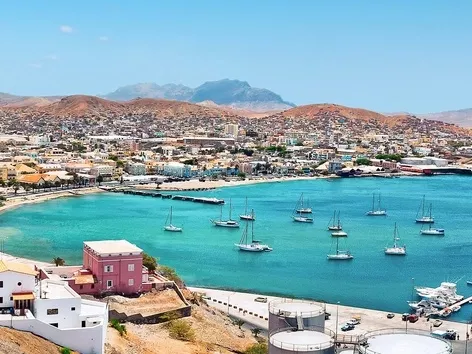Is it safe to visit Cape Verde in 2025?

Cape Verde is an island paradise where African soul meets Portuguese charm, and every corner hides unique beauty and new adventures. Find out how safe it is to travel in this country and what risks tourists should be aware of
Cape Verde, an archipelago off the coast of West Africa, has long been a popular tourist destination for travelers from Nigeria, Belarus, Ukraine, and other countries seeking a unique blend of African, Portuguese, and Creole cultures. Known for their stunning landscapes, from pristine beaches to rocky mountains, the islands offer a variety of experiences, from water sports to cultural exploration. But as with any international destination, it’s important to consider health and safety considerations before planning your trip.
In this article, we’ll explore whether it’s safe to visit Cape Verde in 2025 and how to protect yourself during your visit.
Choose a reliable health insurance policy from Visit World to travel abroad safely.
Cape Verde Safety Overview in 2025
- Political Stability and Crime
Cape Verde is considered one of the most politically stable countries in Africa, with a long tradition of democracy and peaceful elections. The country is free of ongoing conflict or significant political unrest, making it a relatively safe place for tourists. However, as in many countries, petty crime such as pickpocketing can occur in tourist areas, especially in busy markets or around crowded beaches. Always be vigilant and take basic precautions with your valuables.
- Natural Disasters
Cape Verde is not prone to many natural disasters, although it does face some risk from the occasional hurricane, especially during the Atlantic hurricane season (June to November). These storms can cause disruption, but the archipelago is not usually affected as often or as severely as other regions. However, it is always advisable to check weather forecasts and travel advisories before traveling, especially during hurricane season.
- Health Risks in Cape Verde
While Cape Verde is generally a safe destination for travelers, there are certain health considerations to keep in mind. These include risks associated with tropical diseases, limited healthcare infrastructure, and the possibility of intestinal diseases, especially if you are visiting rural areas or consuming unclean food and water.
Intestinal Diseases in Cape Verde
One of the most significant health risks for visitors to Cape Verde in 2025 is the possibility of intestinal diseases that can be contracted through contaminated food or water. The most common diseases include:
- Traveler's diarrhea (TD) is a common illness for those visiting countries where sanitation practices do not meet Western standards. It is usually caused by bacteria such as Escherichia coli (E. coli) and Salmonella.
- Gastroenteritis – a condition commonly called “stomach flu” – is caused by viruses such as rotavirus or norovirus, or by bacterial infections. It causes symptoms such as nausea, vomiting, and diarrhea.
- Typhoid fever – Typhoid fever is caused by the bacteria Salmonella typhi, which is spread through contaminated water and food. It can lead to serious illness if left untreated.
- Hepatitis A and E – These liver infections can be contracted through contaminated water or food, especially in areas with poor sanitation.
- Why are intestinal diseases common in Cape Verde?
Cape Verde's infrastructure is still developing, and while large urban areas such as Praia and Mindelo have better conditions, rural areas of the country may lack proper sewage and sanitation systems. This can lead to contamination of water and food supplies, especially in local food establishments or markets.
The risk of intestinal diseases is also increased if you consume food or drinks from street vendors or if you eat raw foods, such as salads or fruits, that have been washed in contaminated water. In addition, ice made from untreated water can also be a source of contamination.
- Preventive measures for intestinal diseases
To reduce the risk of intestinal diseases, follow these important tips when traveling to Cape Verde:
1. Drink bottled or boiled water: Avoid tap water, even for brushing your teeth. Use bottled water and make sure the seal is intact before opening. If bottled water is not available, boil it before drinking.
2. Eat cooked food: Only eat food that has been thoroughly cooked, preferably hot. Avoid raw meat, seafood, and undercooked vegetables or salads.
3. Eat food from reliable sources: Choose food from reputable restaurants and hotels, rather than street vendors where hygiene standards may be questionable.
4. Hand hygiene: Wash your hands frequently with soap and water, especially before eating or touching your face. If soap and water are not available, use a hand sanitizer with at least 60% alcohol.
5. Avoid ice: Avoid eating ice, as it may be made from contaminated water.
6. Vaccinations: Check with your healthcare provider about any vaccinations you may need before traveling. Hepatitis A, Hepatitis E, and Typhoid are recommended for those visiting Cape Verde.
7. Travel Insurance: It is always a good idea to have travel insurance that covers medical expenses, including those related to gastrointestinal problems, before traveling.
Malaria and Other Transmissible Diseases in Cape Verde
Malaria is not common in Cape Verde, but cases are occasionally reported, especially in rural areas. If you are planning to visit less developed areas, it is advisable to take malaria prophylaxis and use insect repellent. Other transmissible diseases, such as dengue fever, may also occur, although they are rare.
Healthcare Facilities in Cape Verde
Cape Verde has several hospitals and clinics, especially in the larger cities, but healthcare facilities may not be what you are used to in Europe or North America. In the event of a serious illness, you may need to be evacuated to a neighboring country for more advanced care. It is advisable to have travel insurance that includes emergency evacuation coverage.
Exposure to Sun and Heat
Cape Verde's tropical climate means high temperatures year-round, which can lead to dehydration and sunburn. Be sure to drink plenty of water, use sunscreen, and seek shade when the sun is at its peak. If you are not used to a hot climate, take it easy during the hottest parts of the day to avoid heat exhaustion or heat stroke.
Is it safe to visit Cape Verde in 2025?
Overall, Cape Verde remains a relatively safe destination for travelers in 2025. The country offers a unique blend of natural beauty, rich culture, and friendly locals. However, as with any destination, there are risks to be aware of, especially when it comes to intestinal diseases due to poor sanitation in some areas.
By taking proper precautions, such as drinking safe water, eating well-cooked food, and practicing good hygiene, you can minimize your risk of illness and enjoy your vacation to the fullest. Always stay up-to-date with health advisories, check travel advisories, and be proactive about your health and safety. With careful preparation, a trip to Cape Verde can be an unforgettable experience.
Safe travels!
When planning a trip abroad, be sure to take care of a travel insurance policy that will protect you from unforeseen situations during your trip and compensate for unplanned expenses - for medical treatment, in case of lost luggage, flight cancellation, etc.
Buy a reliable travel insurance policy from trusted insurance agents on the Visit World portal!
As a reminder, Africa is a true paradise for wildlife and safari enthusiasts. Every year, thousands of tourists come to the continent to see animals in their natural habitat. We have already told you which national parks travelers should choose and what features each of them has.
Products from Visit World for a comfortable trip:
Travel guide for 200 countries;
Legal advice from a local specialist on visa and migration issues;
Travel insurance around the world (please select the country of interest and citizenship to receive services);
Medical insurance all over the world.
We monitor the accuracy and relevance of our information, so if you notice any errors or inconsistencies, please contact our hotline.
Frequantly
asked questions
When should you avoid Cape Verde?
Is it safe to walk around Sal Cape Verde at night?
Is there a tsunami risk in Cape Verde?
Recommended articles
2 min
Popular
Italy is one of the most popular European countries among expats. It has many historical and cultural attractions, picturesque small towns, beautiful beaches, and world-famous cuisine. Find out more about the top 7 cities in Italy with the highest quality of life 2025
25 Jan. 2025
More details2 min
Blog
World War III: the Safest Countries for Relocation in Times of Global Uncertainty
In a world where uncertainty and global upheaval have become part of everyday life, we seek out places that can provide us with refuge and stability. Find out which countries offer security, a good political system, and a high quality of life, and who in the world is most likely to avoid World War III.
23 Mar. 2025
More details1 min
Travels
A powerful earthquake struck Myanmar in late March, with tremors felt in Thailand, Laos and even China. Find out if it's safe to travel to the region now, what governments around the world are advising, and what safety rules to follow when traveling
01 Apr. 2025
More details1 min
Expats
The safest and most dangerous countries in 2025: Numbeo ranking
In 2025, the Numbeo platform published a ranking of the safest countries in the world for travel. Find out which countries topped the list of the safest, which ranked last in terms of safety, how the safety index was formed, what distinguishes safe countries from unsafe ones, and why tourists are increasingly focusing on this indicator when planning their trips
05 Apr. 2025
More detailsAll materials and articles are owned by VisitWorld.Today and are protected by international intellectual property regulations. When using materials, approval from VisitWorld.Today is required.
